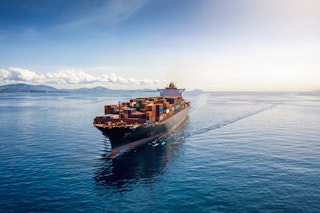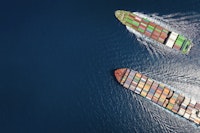A pivotal shift in the EU Emissions Trading System (EU ETS) occurred on 22 November 2023 when the EU Commission adopted a new implementing regulation, changing the default compliance responsibility from the Document of Compliance holders to the registered shipowners - a move that will reshape the industry's current preparations.
Updated on 22 December 2023.
The EU Emissions Trading System (the "EU ETS") will be extended to the maritime industry from 1 January 2024 through a revised EU ETS Directive. On 22 November 2023, the EU Commission adopted a new implementing regulation (the "Implementing Regulation"). Amongst other, the Implementing Regulation changes the party responsible for submitting allowances under the EU ETS from the Document of Compliance ("DOC") holder, which in many cases would be the technical manager, to the registered shipowner. This is a fundamental change which will disrupt current preparations by stakeholders as it will require registered shipowners to formally delegate their EU ETS obligations in order to shift the responsibility to the technical managers or others.
Change of responsible party
Under the new Implementing Regulation, the shipowner will be the entity responsible for EU ETS obligations unless a party mandated by the shipowner to comply with its EU ETS obligations, such as the technical manager or bareboat charterer, can provide the administering authority in the relevant Member State with an original or certified true copy of a document showing that they have such mandate from the shipowner. The Implementing Regulation includes set requirements for the information which needs to be included in the document. However, there are as of yet no standard documents which comply with the requirements.
Whilst this change is likely to be seen as a welcomed development by technical managers as failure to surrender allowances for a single ship could affect compliance for an entire fleet, it is an unwelcomed change for the shipowners who have prepared for the EU ETS on the basis that their technical managers or bareboat charterers will be responsible for compliance with EU ETS obligations.
Issues will no doubt arise from this fundamental change and stakeholders should review charterparties, pool agreements, agreements with technical managers and other relevant contracts to ensure that they will be functional given that the shipowner will now be responsible for compliance by default. Points which need to be considered and other issues which could arise are:
- Shipowners who wish to delegate the responsibility to a third party, such as the technical manager or bareboat charterer, must prepare the necessary mandate document which complies with the requirements of the Implementing Regulation.
- The delegated entity will not be able to open a maritime operator holding account in 2024 until these formalities have been completed. However, any party may open a trading account at any time, including now.
- The Implementing Regulation does not stipulate that the mandated entity must be the technical manager or bareboat charterer. However, the entity must have agreed to take over all the duties and responsibilities imposed by the ISM Code as well as the EU ETS, which means that this would in practice be the DOC holder.
- It is not yet clear whether the EU also intend to change the party responsible under the EU MRV Regulation, however these should be aligned.
Attribution of shipping companies to Member States
The EU Commission has announced that it will publish a list which will attribute each shipping company to a Member State by 1 February 2024. EU shipping companies will be attributed to the administrative authority in a Member States in the following manner:
- EU shipping companies to the administrative authority in the Member State in which they are registered in. The new Implementing Regulation prescribes that this shall be determined by using the country of registration for the shipping company in THETIS-MRV, the system used for reporting emissions under the EU MRV regulations.
- Non-EU shipping companies to the administrative authority in Member States in which they had had the most port calls in the preceding four years. The new Implementing Regulation prescribes that data from SafeSeaNet shall be used to attribute non-EU shipping companies to Member States based on port calls.
- Non-EU shipping companies with no such port calls to the administrative authority in the Member State in which the shipping company has its first voyage falling within the EU ETS.
In light of the change of the responsible party for compliance with EU ETS obligations the attribution of shipping companies to Members States raises some additional issues:
- If these shipowners do not delegate the responsibility to comply with the EU ETS obligations, each shipowner will have to open a maritime operator holding account. This will no doubt increase the administrative burden on the Member States.
- Shipowners with many subsidiaries registered in non-EU countries may find that each subsidiary will be attributed different administrative authorities in Member States depending on the sailing patterns of their vessels.
- There may be local variations in the processes and documentation required with different administrative authorities, as well as varying processing times. Shipping companies should be aware they may be attributed to an administrative authority in a Member State they are not familiar with.
- Processing times for opening accounts (including trading accounts) may increase dramatically, as the administrative authorities in some Member States are already experiencing an influx of applications to open accounts.
Pursuant to the Draft Revised Delegated Regulation (EU) 2019/1122 (Registry Regulation), it is expected that there will be a deadline of 40 working days from the date of publication of the attribution list for shipping companies to apply for a maritime operator holding account.
Norway
The revised EU ETS Directive will come into force in Norway from 1 January 2024.
The Norwegian Environmental Agency has announced that it will be possible for registered shipowners to apply for a maritime operator holding account from 15 January 2024. However, it has stated that DOC holders that will assume responsibility pursuant to a mandate letter should wait until the EU publishes the attribution list by 1 February 2024.
For DOC holders that wish to assume the responsibility from the registered owner, the Environment Agency recommend that the mandate letter is ready by the end of January 2024. Thommessen has created an online form which produces a mandate letter in a form which complies with the requirements. Contact us for more information.
Useful links
Thommessen Sustainability Database
The increased focus on sustainable development is accompanied by accelerating sustainability regulation. Our Sustainability Database helps you navigate the multitude of regulations and industry initiatives, and covers close to 40 different regulations and private law initiatives of relevance to shipping industry players.
The service is available to our clients, potential clients and other partners. Register here

 Henrik Hagberg
Henrik Hagberg
 Mads Haavardsholm
Mads Haavardsholm
 Emilie Falch
Emilie Falch
 Sofie Mæland Tykvenko
Sofie Mæland Tykvenko




